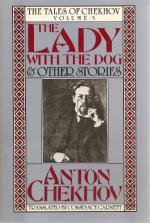|
This section contains 7,205 words (approx. 25 pages at 300 words per page) |

|
SOURCE: Brewster, Dorothy and Angus Burrell. “Soundings: Fiction of A. P. Chekhov and Katherine Mansfield.” In Dead Reckonings in Fiction, pp. 42–70. Toronto: Longmans, Green and Co., 1925.
In the following essay, Brewster and Burrell discuss the various critical opinions of Chekhov, including accusations of immorality, and compare Chekhov's and Katherine Mansfield's use of concrete imagery.
I
Strether's experience in The Ambassadors took all his categories by surprise. Nothing better could happen to anyone, for categories are perilously convenient. We naturally tend to thrust people and all the relations between them into pigeon-holes; to accept, not as mere conveniences for business and intercourse, but as truths, conventional aspects of life. We are told that there are six (or two, or five), psychological types, and forthwith sort out our acquaintances. Chekhov, who disliked categories, remarks that Tolstoi, in Resurrection, divides all the convicts into five classes; why not ten, he asks...
|
This section contains 7,205 words (approx. 25 pages at 300 words per page) |

|


